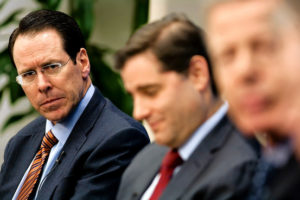 The disconnect between technology and Washington is as vast as the gap between rotary phones and the latest iPad. First there was the clumsy SOPA legislation against online copyright piracy, killed by objections from Web companies and users. The latest disconnect is over whether Washington can free up enough bandwidth to keep smart phones and tablets running.
The disconnect between technology and Washington is as vast as the gap between rotary phones and the latest iPad. First there was the clumsy SOPA legislation against online copyright piracy, killed by objections from Web companies and users. The latest disconnect is over whether Washington can free up enough bandwidth to keep smart phones and tablets running.
The two most prominent voices for more bandwidth are at each other’s throats: Federal Communications Commission chairman Julius Genachowski, who has been warning of spectrum scarcity for several years, and Randall Stephenson, the chief executive of AT&T, whose once-monopoly is the underdog in this dispute.
The FCC has not kept up with the demand for bandwidth, especially as mobile users expect to be able to stream video and use other digital innovations. Mr. Stephenson used his quarterly earnings call with investors last week to lay into the agency, which is remarkable considering how industry executives usually steer clear of antagonizing their regulators.
“The last significant spectrum auction was nearly five years ago, and now this FCC has made it abundantly clear that they’ll not allow significant M&A to help bridge their delays in freeing up new spectrum,” Mr. Stephenson told analysts, referring to how regulators blocked the AT&T bid to buy T-Mobile as a way to get enough bandwidth to compete with market-leader Verizon. “It appears that the FCC is intent on picking winners and losers rather than letting these markets work.” The result? “We pile more and more regulatory uncertainty on top of an industry that is the foundation for a lot of today’s innovation.”
AT&T Randall Stephenson (left) and FCC’s Julius Genachowski agree on need for broadband spectrum auctions—but not on much more.
Mr. Stephenson added, “Growth cannot continue without more spectrum being cleared and brought to market. And despite all the speeches from the FCC, we’re still waiting.”
A common theme of Mr. Genachowski’s speeches for several years has indeed been that there is a “looming spectrum crunch,” but he hasn’t been able to get congressional approval to let the FCC hold a voluntary spectrum auction. This would let holders of underused bandwidth—primarily television stations—sell their rights to higher-value buyers.
The good news is that Congress is getting closer to approving an auction, but with restrictions the FCC is fighting. The question now is whether the FCC will have an open auction, a rigged auction, or miss this window to have any auction.
Bandwidth auctions were conceived by University of Chicago economist Ronald Coase more than 50 years ago as a market alternative to having regulators pick and choose who deserves a license. Past auctions have delivered more than $50 billion to the Treasury. Congress is close to approving another, if only the FCC can bring itself to say “yes,” perhaps with some adjustments to incorporate technical issues. This would be attached to a bill extending the reduction in the payroll tax that would be funded by the billions raised in the auction.
A House bill would require the FCC to allow all telecommunications companies to participate in the auction, without regulators picking winners and losers before the bidding even begins. The worry is that the FCC is reverting to its old practice of handpicking preferred owners of broadband, a form of industrial policy that’s bad on principle, and would also reduce the fees going to the Treasury by limiting bidders.
The FCC is lobbying against this provision, even though an agency spokesperson assured me in a phone interview that “the FCC has no intention of keeping either AT&T or Verizon from participating in the auction.” That’s good, but the market-leading firms might still be forced to sell back some of their bandwidth to meet regulatory views about antitrust.
The FCC is trying to manage competition among telecommunications providers using 1970s-era antitrust theories. Almost every American can choose among four or five telecommunications providers, not just Verizon or AT&T.
The key players in the industry are companies like Apple that aren’t regulated by the FCC but drive bandwidth usage through their mobile operating systems and bandwidth-hogging apps. Even market-leader Verizon can’t provide the kind of fast connections common in Asia and even parts of Europe. Instead of bigger being bad, even the biggest U.S. providers are too bandwidth-constrained to provide world-class service.
If the FCC misses this chance to hold an auction, expect a reversal of the trend toward lower prices and better service. AT&T is already raising rates for its high-volume users. Mr. Stephenson warned that “in a capacity-constrained environment, we will manage usage-based data plans, increase pricing and manage the speeds of the highest-volume users.”
It’s time for the FCC to go back to the basic lesson that Prof. Coase taught. His now-famous Coase Theorem says that without regulatory interference or high transaction costs, valuable resources will flow to their most valued use. The ownership of broadband needs to be determined by markets as quickly as technology changes, not as slowly as Washington decides who deserves to be a winner and who should be a loser.
Read Article: http://online.wsj.com/article/SB10001424052970203711104577200983299490886.html?mod=ITP_opinion_0

